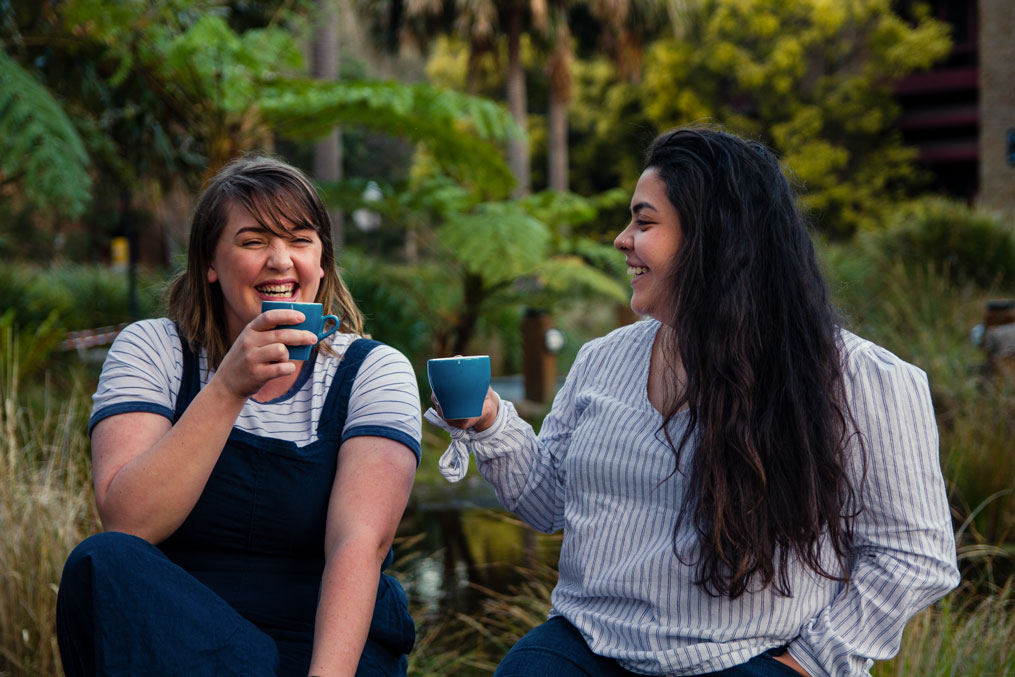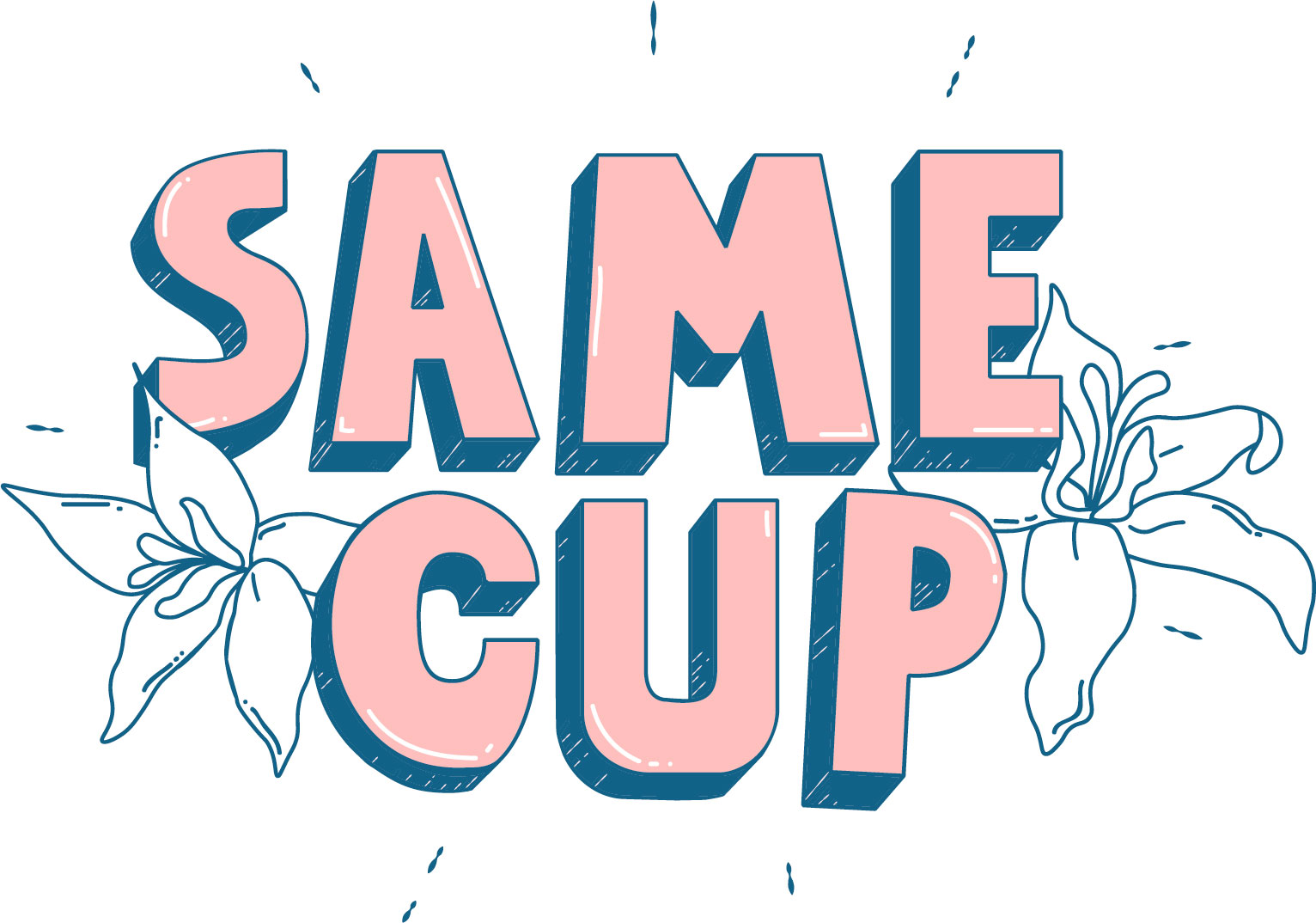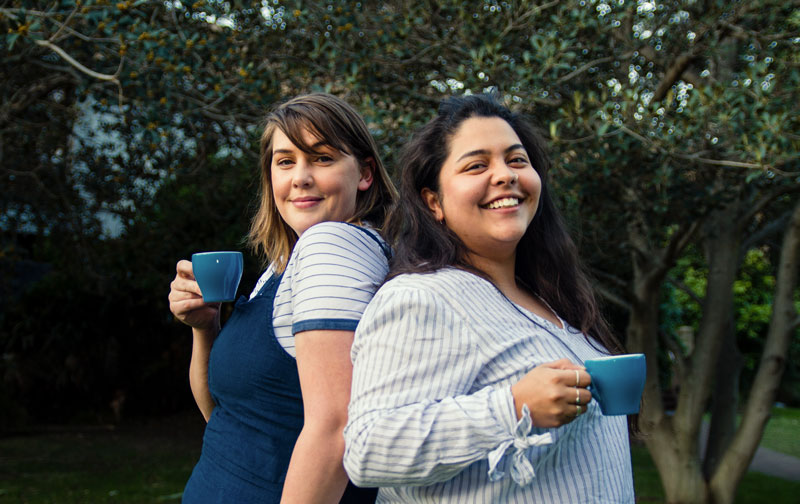Demelza Jones (left) and Shirin Demirdag (right). Photo courtesy of Demelza Jones.
[L]aunching this October, SAME CUP is an Australian first: a new organization that strives to improve the success, empowerment, and visibility of women and the LGBTQI+ folk in the Australian specialty coffee scene. Spearheaded by Demelza Jones, account manager for Five Senses Coffee’s New South Wales team, SAME CUP will encompass events, competitions, spaces, and parties that inspire success through networking, education, and personal development.
“I wanted to combine the networking aspect and the education aspect,” says Jones. “So people can discuss and learn about important subjects like mental and physical health, and how to come back to work after having a baby.”
Before working at Five Senses, Jones was running a takeaway coffee shop on a university campus for three years. But after getting pregnant, it was too hard to keep up the long days and manual labor.
“While on maternity leave, I thought about what I wanted to do with my career,” she says. “I wanted to stay in coffee, but I didn’t want to be making coffee forever.”
Finding Inspiration
The idea for SAME CUP started brewing while Jones was listening to an episode of the podcast Boss Barista featuring Molly Flynn, founder of the #coffeetoo movement.
“Listening to her story made me think about things that have happened to me in my career and then I just thought, well sh*t, she can do this and she’s got so much support, so that was a giant motivation for me,” Jones explains.
Shortly after, Christine Cottrell, a coffee veteran and organizer of women in coffee initiatives across Australia, asked Jones to take over the NSW State for women in coffee events. Then, Jones attended Barista Connect, a networking event run by women in the coffee industry.
All these actions led her to think: “If I want diversity and inclusion in positions of power—who am I to come in as a straight white girl? That’s a pretty narrow perspective,” she says. “So I decided I wanted SAME CUP to not just be about women in coffee, I wanted it to include as many marginalized groups as possible….A lot of amazing queer folk work in coffee but most of them are stuck in entry-level positions. There isn’t much going on in positions of influence.”
 Sharing the Spotlight
Sharing the Spotlight
In early July of this year, Jones put up a Facebook post that said: “Are you a woman or identify as a woman in the coffee industry? I want to put a spotlight on mental and physical health and sexual harassment, is there anyone that’s interested in helping me out?”
Quickly, Jones began to receive a reply after reply from men and women asking what they could do to help. Jones said she had about 30 to 40 women and men, coming back to her within a week, with many offering spaces or volunteering their services.
“It was very overwhelming and beautiful,” she says. “That feedback spoke to me in volumes that something needed to be done. There is a demand for this, people want it, and that was how it all started.”
One of the women who wrote back was Shirin Demirdag, a good friend of Jones’ and someone she had previously trained to make coffee.
“Shirin is really good at all the things I am not: writing reports, reading through wordy documents and all that,” says Jones. “So we started meeting every Sunday to figure out what we needed to do.”
A Space for Inclusivity
Over the last three months, discussions about what SAME CUP should stand for have continued to change, with Jones explaining that she’s open to having conversations to figure out what people want out of the organization.
“At the end of the day it isn’t about me, I’m just one girl, the more feedback I can get from the greater community, whether it is positive or negative, is great because I can amend it and make it stronger, greater and more effective.”
Initially, SAME CUP was to be a safe space for women and queer folk so they wouldn’t feel intimidated and without the “macho vibe.” But a friend brought up the question: “How do you plan on bringing inclusivity by being exclusive?”
“I know many dudes who fit my target and want to help, and I didn’t want to exclude those people,” says Jones. “So after a lot of thinking I decided to open up the events to everyone.” Despite this decision, Jones emphasizes the fact that the main focus remains on ensuring women and queer folk feel represented and heard.
“These systemic problems go across all industries,” she says, “but coffee is the audience I have and that’s why I’m doing it in this space.”
More Voices & Visibility
Besides launching SAME CUP, Jones has a few other projects down the pipeline. In February 2019, just before Melbourne International Coffee Expo (MICE) kicks off, Jones is organizing the first Cherry Roast Australia competition, with full support from influential individuals, such as Chocolate Barista blogger and activist Michelle Johnson, and businesses, including Five Senses Coffee Roasters.
Cherry Roast Australia was inspired by the annual Denver, Colorado-based coffee competition, Cherry Roast designed for women, genderqueer, and gender nonconforming baristas, founded by Amethyst Coffee owner Elle Jensen.
“Cherry Roast is hands down the best competition I have ever heard of—certainly the most relevant with rounds like triangulation and dialing in,” says Jones. “The fact it was created to empower women and queer folk is just amazing.”
And she isn’t stopping there: Jones has a 10-year plan to ensure continuous visibility, equality, and awareness by creating a SAME CUP certification so that cafés, corporations, competitions, and events are held accountable on how they run their businesses.
“These organizations can then buy the certification to show they have achieved or are striving towards inclusivity and diversity in their work culture,” she says.
Jones also has plans for a traveling event that focuses on educating and connecting women and queer folk in rural areas through coffee.
“I want more diversity in positions of influence and power in coffee,” says Jones. “I want more diversity visible for everyone starting in coffee, so people can go ‘look at that woman in coffee, I want to be like her.’”
She adds: “I want there to be more voices, and the more diverse voices we have the stronger specialty coffee will be.”





 Sharing the Spotlight
Sharing the Spotlight











